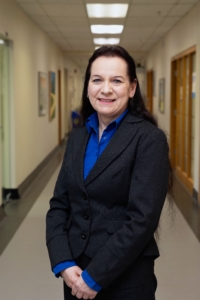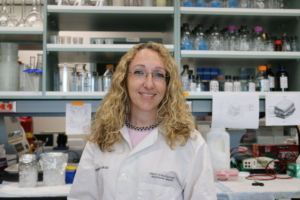February 15, 2024
Darlene Sorin, of Lockport, has a saying. “It’s never good to have a heart attack. But if you do have one, St. Boniface Hospital is the best place to be.”
Her saying comes from experience, after she had a STEMI heart attack, the most serious kind, at work in the spring of 2023. She was 61 years old. Sorin had started her job as Executive Assistant to St. Boniface Hospital President and CEO Nicole Aminot less than a year earlier.
It was April 26 to be exact; Sorin remembers it was Administrative Professionals’ Day. Aminot had given her a bouquet of flowers that morning.
It had been a typical workday in the Hospital’s Corporate Office, Sorin recalled. She and a colleague went for their usual four-kilometer walk in the Hospital tunnels over the lunch hour.
“I came back to my desk, sat down, and started working,” said Sorin. “Suddenly, I had a strange feeling, and it wasn’t good.” She wasn’t nauseated or out of breath, however. She glanced down and noticed the skin on her arm was pale, “like Casper the Friendly Ghost,” she said.
Her friend, Karen, who had walked with her, came into the office. She noticed Sorin was looking pale and leaning to one side in her chair. “I told her I just didn’t feel right,” remembered Sorin.
Concerned, the first person Karen thought to call was Dr. Scott Brudney, whose office was just down the hall. He rushed to the Corporate Office to check on Sorin.
“Dr. Brudney took one look at me and said, ‘Darlene, you have to go straight to the Emergency Department.’ He could tell what was happening.” Sorin tried halfheartedly to argue and avoid leaving her desk. “That’s how in denial I was,” she said.
Down the hall to the Emergency Department

Sorin’s colleagues sat her in one of the blue Staxi transport chairs the Hospital has on hand to move patients. She was drifting in and out of consciousness.
“Karen wheeled me to the Emergency Department,” recalled Sorin. “She was so anxious; she was accidentally bumping the chair into things in the hallways. I said we were going to have to revoke her driver’s license, and we laughed. At least I never lost my sense of humour.”
Once there, the triage nurses moved quickly to assess Sorin’s condition as they would any patient presenting with heart attack symptoms. An electrocardiogram test confirmed Sorin was having a heart attack. She needed treatment immediately to save her life.
“They put me on a stretcher and sent me to the Cardiac Catheterization Laboratory (Cath Lab), just like that,” she said. “As they wheeled me through the doors, I remember remarking that I booked the executive tours of the Cath Lab as part of my job.”
Sorin learned that her right coronary artery was completely blocked. Her cardiologist, Dr. Ashish Shah, put in three stents to unblock her artery, threading each from her left wrist and up her arm to her heart. (She returned to St. Boniface Hospital in June of 2023 to have a fourth stent put in later.)
“I was never afraid, never anxious. I felt like I was in really good hands,” she said. “Dr. Shah patted me on the shoulder and said, ‘Darlene, you will be fine. Don’t worry.’ The care I received was truly remarkable; all the staff were fantastic.”
Women’s symptoms often unrecognized
Heart disease is the number 1 cause of premature death in women in Canada. Heart attacks run in Sorin’s family, she said. Both of her parents died of them, in fact.
“My father had his heart attack at home. I was 14 at the time. My older brother, 17, and I actually administered him CPR,” she said.
Women having heart attacks often present differently than men. Studies have shown that 53 per cent of women who experience heart attack symptoms have them go unrecognized.
“My father clutched at his chest and fell to the ground when he had his heart attack, like you see in movies,” explained Sorin. “My symptoms were totally different from his, or what you might expect. With mine, I wasn’t nauseated, not even dizzy. I just didn’t feel good.”
Women can even experience a heart attack without chest pain or discomfort. “My heart attack was not painful,” she said.
“I’m in awe that I had a heart attack. Sometimes I still don’t believe it.”
Common symptoms of a heart attack for women include shortness of breath, pressure or pain the lower chest or upper abdomen, dizziness, light-headedness or fainting, upper back pressure, or extreme fatigue. The pain can be felt elsewhere, such as in the chin and lower jaw.
“If I had been at home, I would have died. I would have said to my husband, Jacques, ‘I don’t feel very well; I’m going to go lie down.’ And I probably would have never woken up,” said Sorin.
She believes she was in the right place at the right time. “My family is so thankful it happened at St. Boniface Hospital,” she said. “I’m in awe that I had a heart attack. Sometimes I still don’t believe it.”
She also gained a newfound appreciation for the work being done next door to her building, over in the Albrechtsen Research Centre at St. B.

There, researchers like Dr. Inna Rabinovich-Nikitin, Principal Investigator with the Institute of Cardiovascular Sciences at St. Boniface Hospital, are breaking new and exciting ground with the new women’s heart health research initiative.
“I’m told that women remain under-studied, under-diagnosed, under-treated, and under-aware when it comes to their heart health. Together we can do better,” she commented.
“To other women, I would say never ignore any symptoms. I want them to be very aware there are such different symptoms for women. So, pay attention. Sometimes it’s more than just not feeling well. And don’t be afraid or reluctant to go to the Emergency Department if you need to.”
Looking back on her experience, Sorin says she feels more connected to St. Boniface Hospital. “I work at St. B, and I was also a patient,” she reflected. “It just goes to show, St. B staff are also part of the community the Hospital serves.”


